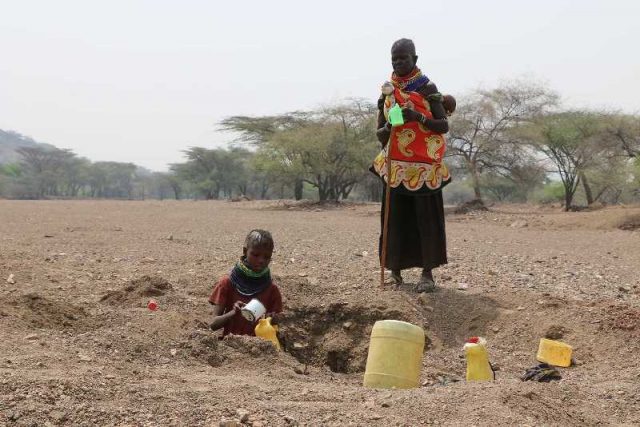TUE 26 APRIL, 2022-theGBJournal| The situation is particularly stark in six areas of Somalia, where famine is likely if rains fail this season, if food prices continue to rise and if humanitarian assistance is not scaled up to reach the most vulnerable populations.
The pledges were made at a high-level round table in Geneva, co-hosted by the United Nations Office for the Coordination of Humanitarian Affairs (OCHA) and the EU’s Civil Protection and Humanitarian Aid Operations (ECHO), and with the participation of senior representatives from the Governments of Somalia, Kenya and Ethiopia.
Humanitarians have called for $1.4 billion for humanitarian response and protection for drought-affected people across the Horn of Africa.
With the funds pledged today, humanitarian agencies will provide urgent food, nutrition, cash and health assistance, as well as fodder and medicines to keep livestock alive.
Today’s round table was held as the Horn of Africa faces a fourth consecutive poor rainy season, which is already causing acute hunger and malnutrition, mass displacement, disease outbreaks and heightened protection risks for millions of people.
Already 1 million people have left their homes due to a lack of water or pasture, and at least 3 million livestock have died.
Drought across the Horn of Africa comes on top of conflict in Somalia and Ethiopia; two years of pandemic-related socioeconomic stress; and a prolonged desert locust crisis. The region is also now grappling with the impacts of the conflict in Ukraine, which is driving up the price of basic foods and other necessities, such as fuel and fertilizers.
UN humanitarian chief Martin Griffiths said: “Once again, vulnerable people across the Horn of Africa are falling victim to the cruelty of acute hunger and potential famine in a crisis that is not of their own making. We must all step up and show the people of this region that we are here to help alleviate their suffering and that there is no place for famine in the twenty-first century.”
The EU Commissioner for Crisis Management, Janez Lenarčič, said: “The humanitarian consequences of the historical drought affecting the Horn of Africa are dramatic. Between 15 and 16 million people are already affected by the drought and in need of life-saving assistance. In addition, the dependency on Ukrainian and Russian imports is already impacting food availability and affordability in the region. The time to act is now.”
In Somalia, more than 6 million people are acutely food insecure, 81,000 of them at catastrophic levels, while 1.4 million children are acutely malnourished. Ninety per cent of Somalia’s districts are affected by drought and up to 90 per cent of its water sources are drying up, including the Shabelle and Juba Rivers, which are at historic lows. Since early 2021 drought has uprooted 759,400 people, half a million of them in the first three months of this year.
In Kenya, an estimated 3.5 million people — or close to a quarter of the population in the Arid and Semi-Arid Lands of north and east Kenya — are acutely food insecure. For children under age 5 in Mandera, general acute malnutrition levels are over 34 per cent and severe acute malnutrition levels at 7.9 per cent, far surpassing emergency thresholds. Intercommunal tensions over access to water and pasture are rising as herders and residents are forced to travel, encroaching on each other’s territory.
In Ethiopia, up to 6.5 million people are acutely food insecure in the Oromia, Southern Nations, Nationalities and Peoples’, Southwest and Somali regions, while 1.5 million livestock have died, destroying people’s livelihoods. At least 286,000 people in the Somali and Oromia regions have migrated in search of water, pasture or assistance. Other people, often the elderly or sick, are often unable to travel. The drought is causing severe water shortages and food insecurity, eroding children’s nutritional status, and exposing women and girls to gender-based violence due to displacement and having to travel further for water.
Twitter-@theGBJournal|Facebook-The Government and Business Journal|email: gbj@govbusinessjournal.ng|govandbusinessj@gmail.com










